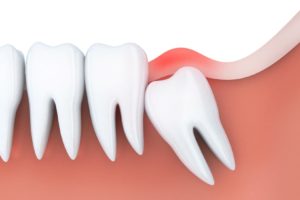 Between the ages of 16 and 25, a third set of molars erupts, called your wisdom teeth. Although they were once necessary to chew tough foods, humans have evolved, and they no longer serve a purpose. Human jaws have narrowed over time, which means most people don’t have enough room in their mouths to accommodate another set of molars. According to the American Academy of Oral and Maxillofacial Surgeons, 90% of people will experience at least 1 impacted wisdom tooth. This results in 5 million people having wisdom teeth removed every year. If your third molars are giving you grief, here are a few signs that you might be dealing with an impaction.
Between the ages of 16 and 25, a third set of molars erupts, called your wisdom teeth. Although they were once necessary to chew tough foods, humans have evolved, and they no longer serve a purpose. Human jaws have narrowed over time, which means most people don’t have enough room in their mouths to accommodate another set of molars. According to the American Academy of Oral and Maxillofacial Surgeons, 90% of people will experience at least 1 impacted wisdom tooth. This results in 5 million people having wisdom teeth removed every year. If your third molars are giving you grief, here are a few signs that you might be dealing with an impaction.
Causes of Impacted Wisdom Teeth
Few people have wisdom teeth erupt without any issues, which is why it’s important to have a wisdom tooth consultation around the age of 16; however, it’s never too late to schedule an appointment. Impactions are most often caused by too little space in the mouth, which can cause 1 or more teeth to:
- Grow at an angle toward the second molar.
- Grow at an angle toward the back of the mouth.
- Growing at an angle parallel to the jawbone.
- Get trapped within the jawbone.
Signs of an Impacted Wisdom Tooth
Symptoms of an impacted tooth rarely improve without treatment. You can experience several signs of an impaction, like:
- Swollen or tender gums.
- Bleeding gums.
- Swelling at the jaw.
- Pain in the back of the mouth.
- Bad breath.
- Unpleasant taste in the mouth.
- Difficulty opening the mouth.
- Difficulty chewing.
- Infections.
- Damage to adjacent teeth.
Removing an Impacted Wisdom Tooth
If you have wisdom tooth pain, your dentist or oral surgeon will examine your mouth and review X-rays to have a complete picture of your dental health. Based on the results of your examination, they can determine if your tooth is partially or fully impacted, which will require removal. Although no one looks forward to oral surgery, you don’t want to delay the procedure because you’ll be at risk of:
- Damage to adjacent teeth.
- Fluid-filled cysts.
- Tooth decay.
- Gum disease.
A surgical extraction is necessary to remove teeth fully or partially trapped in the bone or gums. Your oral surgeon will use sedation to keep you comfortable. They’ll open your gum tissue to gain access to your tooth, which will be carefully broken into smaller pieces for easy removal. Your gum tissue is sutured closed, and your mouth will be healed in just a couple of weeks.
You don’t have to live with wisdom tooth pain. Your oral surgeon can stop your discomfort and improve your dental health.
About Dr. John Rutledge
Dr. Rutledge earned his dental degree at the University of Nebraska Medical Center College of Dentistry, as well as his residency in periodontics and Master of Science in Oral Biology. He has continued his education to achieve certifications in periodontology and implant surgery. Request an appointment through his website or call his office at (402) 382-6282 to schedule your wisdom tooth consultation.
